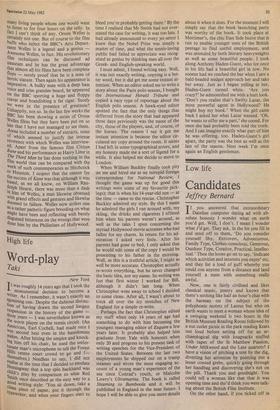High life
Word-play
Taki
New York It Was roughly 14 years ago that I took the monumental decision to become a writer. As I remember, it wasn't exactly an agonising one. Despite the dubious distinc- tion of having drawn the second longest suspension in the history of the game — the Years — I was nevertheless known as 'fle worst player on the tennis circuit. (An American, Earl. Cochell, had made sure I Was second best even in the banishment stakes. After hitting the umpire and knock- ing him off his chair, he used the unfor- tunate I Hills man's microphone to tell the Forest centre court crowd to go and f- hemselves.) Needless to say, I did not realise at the time that I decided to emulate Hemingway that a top spin backhand was child's play by comparison to what Red Smith once described as the easy way to a good writing style: 'You sit down, take a *clean piece of paper, put it through the Lypewriter, and when your fingers start to
bleed you're probably getting there.' By the time I realised that Mr Smith had not over- stated the case for writing, it was too late. I had already announced to every jet-setter 1 knew that the Nobel Prize was simply a matter of time, and what the tennis-loving public had failed to appreciate was recog- nised as genius by thinking men all over the Greek- and English-speaking world.
I must admit, I found writing easy. Well, it was not exactly writing, copying is a bet- ter word, but it did get me some instant at- tention. When an editor asked me to write a story about the Paris polo season, I bought the International Herald Tribune and copied a racy type of reportage about the English polo season. A hawk-eyed editor spotted the fact that the only things that differred from the story that had appeared three days previously was the name of the city, those of the players, and, of course, of the horses. The reason I say it got me instant attention is because the editor cir- culated my copy around the room. It seems I had left in some typographical errors, and my honesty made me a sort of legend for a while. It also helped me decide to move to London.
When William Buckley finally took pity on me and hired me as an intrepid foreign correspondent for National Review, I thought the game was up for good (his writings were some of my favourite pick- ings); that is when his 14-year-old son — at the time — came to the rescue. Christopher Buckley admired my style. By this I mean he admired the girls 1 ran around with, my skiing, the drinks and cigarettes I offered him when his parents weren't around, as well as the tales I spun concerning the myriad Hollywood movie actresses who had fallen for my charm. In return for his ad- miration I asked very little. After his parents had gone to bed, I only asked that he would edit some of the copy I would be presenting to his father in the morning. Well, as this is a truthful article, I might as well be more accurate. Christopher actually re-wrote everything, but he never changed the basic idea, nor my name. So writing was fun that first winter I worked for Bill, although it didn't last long. When Christopher went away to school I decided to come clean. After all, I wasn't about to treck all over the icy stretches of New England for a simple re-write. Perhaps the fact that Christopher edited my stuff when only 14 years of age had something to do with him becoming the youngest managing editor of Esquire a few years later. It probably also helped him graduate from Yale with honours when only 20 and progress to his present task of writing speeches for the Vice-President of the United States. Between the last two employments he shipped out on a tramp steamer and wrote the most engaging ac- count of a young man's experience of the sea since Conrad's youth, or Malcolm Lowry's Ultramarine. The book is called Steaming to Bamboola and it will be published in England in the near future. I hope I will be able to give you more details
about it when it does. For the moment 1 will simply say that the book launching party was worthy of the book. It took place at Mortimer's, the chic East Side bistro that is run to enable younger sons of the British peerage to find useful employment, and was attended.by both literary heavyweights as well as some beautiful people. I took along Anthony Haden-Guest, who for once in his life had a beautiful girl in tow. No sooner had we reached the bar when I saw a bald-headed midget approach her and take her away. Just as I began yelling at her, Haden-Guest turned white. 'Are you crazy?' he admonished me with a hurt look. 'Don't you realise that's Swifty Lazar, the most powerful agent in Hollywood? He might buy my book.' When the girl came back I asked her what Lazar wanted. 'Oh, he wants to offer me a part,' she cooed. For once she had probably been told the truth. And 1 can imagine exactly what part of him he was offering, too. Haden-Guest's girl apart, the party was the best as well as the last of the season. Next week I'm once again an English gentleman.






































 Previous page
Previous page